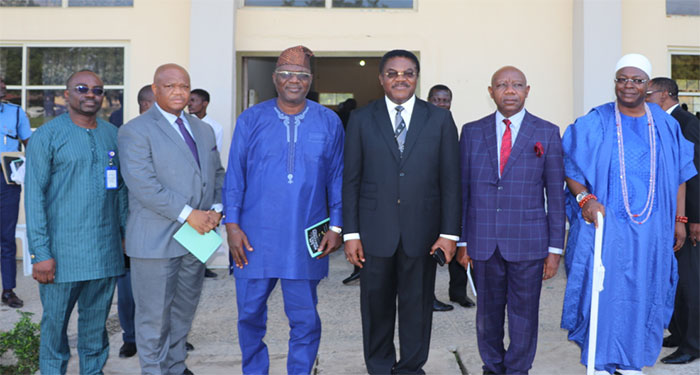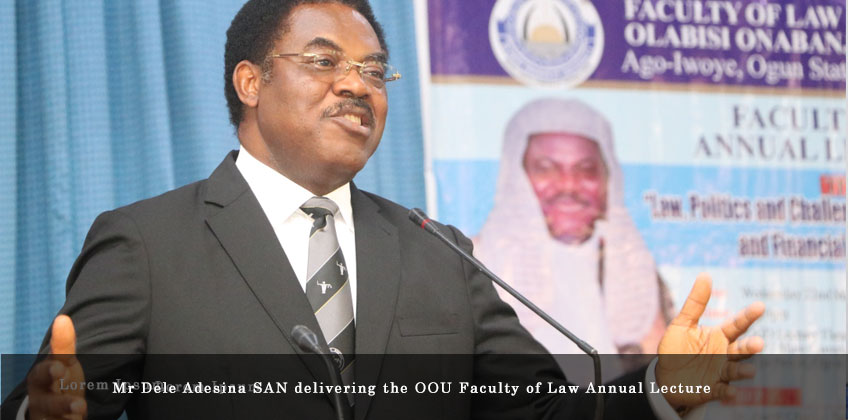… As Faculty of Law holds annual lecture
A Senior Advocate of Nigeria, Dele Adesina, has said the Economic and Financial Crimes Commission (EFCC) must be fully energised with reasonable budget and adequate personnel accompanied with proper and solid training to carry out the onerous task of fighting corruption in the country. The legal luminary attributed the humongous level of poverty among Nigerians to corruption, stressing that things must henceforth be done differently to achieve a better society.
Adesina, a former General Secretary of the Nigerian Bar Association (NBA) and Life Member of the Distinguished Body of Benchers, made the call while delivering the 2022 Annual Lecture of Faculty of Law, Olabisi Onabanjo University (OOU), Ago-Iwoye. The Lecture, entitled “Law, Politics and Challenges of Prosecuting Economic and Financial Crimes in Nigeria” was held on Wednesday 22nd March, 2023 at the Otunba Gbenga Daniel Lecture Theatre, Main Campus, Ago-Iwoye.
According to the Guest Lecturer, the EFCC and its operations have been one of the most debated and talked about institutions since the establishment of the anti-graft agency by the government of former President Olusegun Obasanjo in 2002. He noted that while some commentators have applauded the activities of the Commission as one of the best things to have happened to Nigeria, others have condemned its commando-like operational modalities and insisted that its activities are selective and occasionally constitute an affront on the Rule of Law.
“Whichever side of the divide one may belong, one thing is definite: today in Nigeria, you can only ignore the Economic and Financial Crimes Commission at your own peril. While it is true that impunity still reigns supreme in the country, at least people are much more careful than ever before. It will not be an over-statement if I say that the fear of EFCC is gradually becoming the beginning of wisdom both in the private and public sectors of the country’s economy,” he said. Adesina, who attributed the failure of Nigeria to achieve greatness to corruption, affirmed that sundry stories of arraignment and prosecution of past and present government functionaries for various fraudulent practices simply explained the indispensability of the EFCC and its sister agency, the Independent Corrupt Practices and other related offences Commission (ICPC).

of Nigeria, Dele Adesina, at the OOU Faculty of Law Annual Lecture
While espousing the challenges of prosecuting economic and financial crimes in Nigeria, the foremost legal practitioner stated that the threats are systemic, structural and attitudinal, adding that they often pose debilitating challenges to efficient and speedy administration of justice in the country. Adesina explained that the establishment of EFCC, investigation and arrest, bail process, preliminary and clearing house applications, the trial process, computer generated evidence and constitutional right to fair hearing are some of the inherent sources of procedural challenges to efficient prosecution of economic and financial crimes.
Aside the foregoing, the erudite lawyer disclosed that substantive matters such as delay and congestion, attitude of the practitioners, including advocates and judicial officers, media trials, inadequate funding as well as politics and policies constitute additional threats to the prosecution of economic and financial crimes and justice administration generally in Nigeria. He said, “It is well known that delay and congestion are major challenges facing administration of justice in Nigeria, notwithstanding the attempt made by the Administration of Criminal Justice Act 2015 to prioritise criminal matters. It is my humble submission that delay in our courts are the direct consequences of the system and structure of our justice administration.”
“Our Constitution established a triangular structure of judicial system. This structure in itself makes speedy dispensation of justice whether in civil or criminal cases extremely difficult, if not impossible.”
Adesina advocated the appointment of more judges for the nation’s courts and also enjoined legal practitioners and judicial officers to desist from negative attitudes which constitute “roadblocks” to speedy prosecution of cases in courts. The Guest Lecturer, who frowned at the inadequate funding of the judiciary in Nigeria, said the justice sector must be properly funded to bring about efficient administration of justice.
“Go to some of the states in the Federation, the court buildings are dilapidated. Many have no functional generators to back up energy supply. Where they have backup generators, there is no money to run them. Yet, we profess to be running a constitutional democracy where Rule of Law must reign supreme,” he remarked.
Adesina submitted that until Nigeria produces leaders that will place themselves at the service of the nation at all levels of governance, the solution to the country’s multifarious problems will remain a mirage and a hope that cannot be fulfilled.
His words: “We all know our problems as a nation and I dare say that we also know the solutions to these problems. However, we always technically avoid the problems believing that they will solve themselves. Please, recognise that no problem is ever solved by technically avoiding it. Recognise also that nothing works by itself. Things are made to work!
“In my humble opinion, until the politicians who rule over us get our priorities right, nothing and absolutely nothing will be right including but not limited to our justice system and so many other existential life issues in Nigeria such as the economy and security. Investment in the judiciary is an investment in justice. Investment in justice is an investment in democracy and I submit that investment in democracy is an investment in the development of the people.”
The Senior Advocate, who expressed gratitude to the Faculty of Law for inviting him to deliver the lecture, used the occasion to admonish the students to remain focused, dedicated and steadfast in their educational pursuit, especially as it relates to the legal profession.

Prof. Ayodeji Agboola; Guest Lecturer, Mr Dele Adesina SAN; Acting Dean, Faculty of Law, Dr Gbade
Akinriimade, and the Atayero of Aramoko-Ekiti, Oba Olusegun Aderemi, at the event
Earlier in his opening speech, the Vice-Chancellor of the University, Prof. Ayodeji Agboola, who chaired the event, said the topic of the lecture was apt in view of the prevailing socio-economic and political situation of the country. He enjoined the audience, especially the Law students present, to pay attention to the presentation of the Guest Lecturer.
On his part, the Acting Dean, Faculty of Law, Dr Gbade Akinriimade, said in his welcome address that the annual lecture was institutionalised to reorientate public discourse on topical legal issues, stimulate academic excellence for Law students, expand the frontiers of legal knowledge and endear the legal profession to the general public.
The Acting Dean, who explained that the Faculty could not organise the lecture series for a while due to the COVID-19 pandemic and prolonged strike by the Academic Staff Union of Universities (ASUU), expressed delight that the 2022 edition eventually held after a couple of postponements. He thanked the Vice-Chancellor for granting necessary approval for the event.
Other dignitaries at the lecture included the University Registrar, Mr Femi Ogunwomoju; the Librarian, Dr Adebambo Oduwole; the Ogun State Chief Judge, Justice Mosunmola Dipeolu, who was represented by Justice E. O. Osinuga; Kunle Ogunba, SAN; Barrister Adebayo Ayodele, and Chief Magistrate Kunle Sodeinde.


